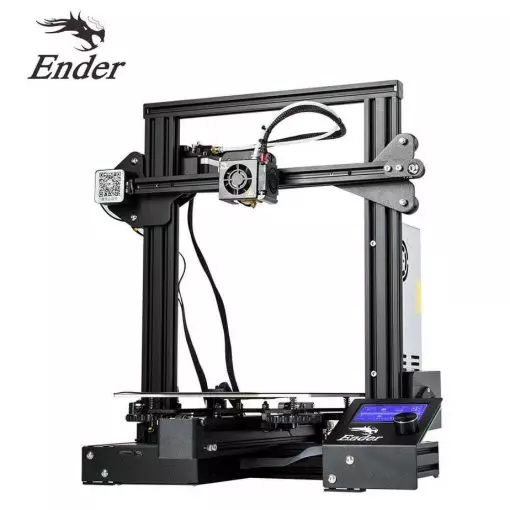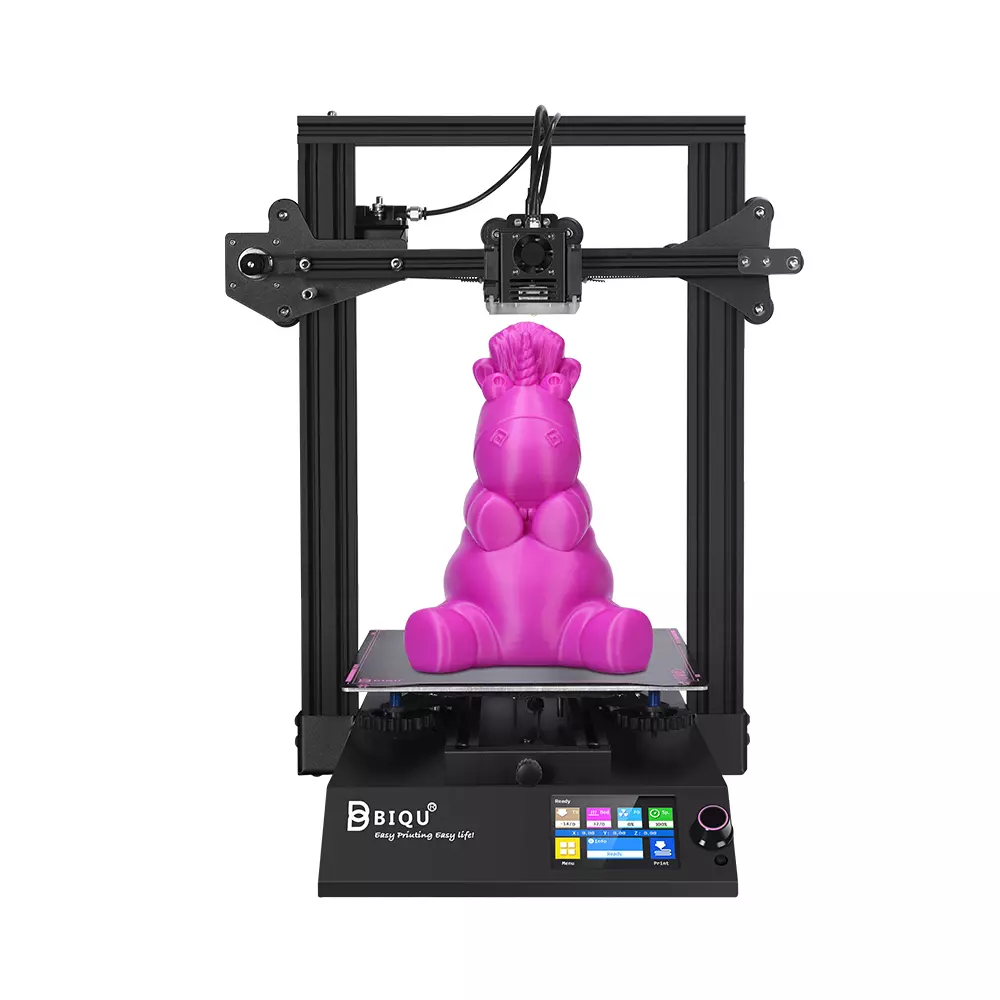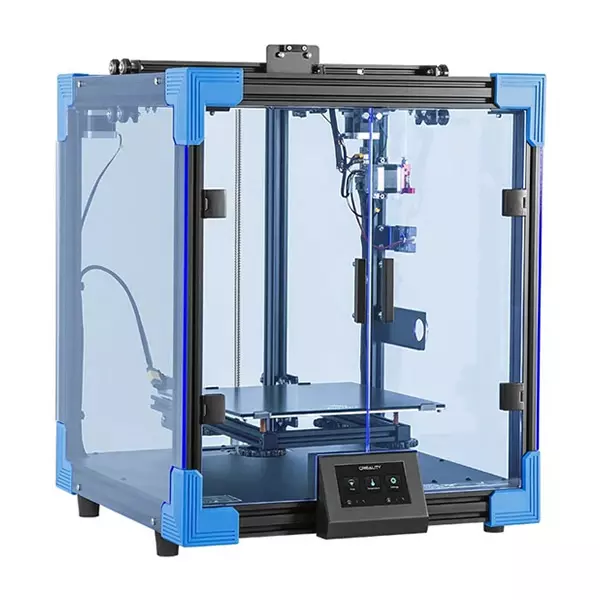Compare Ender 3 vs BIQU B1 vs Ender 6
Comparison between the best 3D printers
Choose the best 3D printer at the best price. The cheapest 3D printers are here.
Buy a 3D printer here with 3D Fila.
 |
 |
 |
|
| Model | Ender 3[BUY Ender 3] |
BIQU B1 |
Ender 6[BUY Ender 6] |
| Printing Material | Filament | Filament | Filament |
| Estimated price | $210,00 | $269,00 | $499,00 |
| Fabricante | Creality 3D | BigTreeTech | Creality 3D |
| Release Year | 2018 | 2020 | 2020 |
| Print Volume [mm] | 220x220x250 | 235x235x270 | 250x250x400 |
| Printer Size [mm] | 440x440x465 | 412x402x492 | 495x495x650 |
| Weight [kg] | 6,62 | 8,00 | 22 |
| Power Loss Recovery | NO | YES | YES |
| Enclosed printer | NO | NO | NO |
| Bed Leveling | Manual | Manual | Manual |
| Filament End Sensor | NO | YES | YES |
| Bed type | Heated | Heated | Heated |
| Power supply system | Bowden | Bowden | Bowden |
| Standard nozzle | 0,4 | 0,4 | 0,4 |
| Maximum Nozzle Temperature [°C] | 255 | 250 | 260 |
| Maximum Bed Temperature [°C] | 110 | 100 | 100 |
| Maximum printing speed [mm/s] | 180 | 100 | 150 |
| Filament holder | YES | YES | YES |
| Camera for supervision | NO | NO | NO |
| Recommended filaments | PLA, TPU, ABS, PETG | PLA, TPU, ABS, PETG | PLA, TPU, ABS, PETG |
| Recommended slicers | Cura, Simplify, Slic3r | Cura, Simplify, Slic3r | Cura, Simplify, Slic3r |
| Maximum Resolution [mm] | 0,1 | 0,1 | 0,1 |
| Processor | 8 bits | 32 Bits BTT SKR V 1.4 | 32 bits |
| Display | Mono | Touchscreen TFT 3,5'' | Touchscreen TFT 4,3'' |
| Power Supply | 24V / 270W | 24V / 360W | 24V / 504W |
| Connectivity | SD / USB | SD / USB | SD / USB |
| Operating systems | Windows, Mac, Linux | Windows, Mac, Linux | Windows, Mac, Linux |
| Date of registration in the system | 2021-04-13 | 2021-04-14 | 2021-04-15 |
| Release date | 2018 | 2020 | 2020 |
| Extra features | The Ender 3 V1 is a DIY assembly 3D printer, a sales leader since 2017, standing out for its cost-benefit. With a wide printing capacity, it has a CNC machined structure for precision and stability. It offers high-precision prints with low noise, thanks to its innovative V-profile and pulleys. It has a self-adhesive magnetic platform for easy removal of models and excellent adhesion. The Ender 3 heats up quickly, reaching 100°C in 5 minutes, ideal for agile prints. It includes protection against power failures, allowing you to resume printing after interruptions, saving time and material. | The BIQU B1 is an advanced 3D printer with a silent 32-bit BTT SKR V1.4 motherboard and ARM Cortex-M3 CPU, offering DIY interfaces (I2C, SPI, WiFi) and dual Z-axis. Its dual BTT B1 TFT35 V3.0 operating system allows real-time monitoring and multiple printing modes, including G-code visualization effects. It stands out for its BIQU SSS (Super Spring Steel), ensuring easy model adhesion and simplified removal, with the possibility of using it on both sides. It includes a filament sensor, automatically pausing printing in case of filament breakage. The multicolored RGB lights integrated into the hotend allow you to view the printing status even at night. Additional notes include the need for a BIQU-specific Type-C cable and extra interfaces for smart filament sensor and BL Touch. | The Creality Ender 6 stands out in the world of 3D printers with its CoreXY system, offering fast and high-quality prints. With a robust design, it has acrylic panels to protect against air currents, optimizing the printing of materials that require higher temperatures. It features a generic Creality hotend, effective up to ~240°C. Its differentials include 10mm GATES belts, promoting stability at high speeds, and a 360W power supply for reliable performance. The machine also has an intuitive user interface through a 4.3-inch touchscreen. |
| Support for multiple colors and materials (AMS and CFS) | NO | NO | NO |
Notes * |
|||
| Cost-benefit | 6 / 10 | 6 / 10 | 7 / 10 |
| Hardware | 0.5 / 10 | 2 / 10 | 2.5 / 10 |
| Screen | . | . | . |
| Print volume | 3 / 10 | 3 / 10 | 4 / 10 |
| Performance | 1 / 10 | 0 / 10 | 1 / 10 |
| [BUY Ender 3] | [BUY Ender 6] |
Conclusion |
| In comparing the three 3D printers—Ender 3, BIQU B1, and Ender 6—each model offers unique features that cater to different user needs and budgets: 1. **Ender 3**: As the most affordable option, the Ender 3 delivers robust performance for hobbyists and beginners. Its printing volume is suitable for a variety of projects, and its DIY assembly allows for customization. However, it lacks advanced features like power loss recovery and a filament end sensor, which may limit its usability for some users. 2. **BIQU B1**: Positioned in the mid-price range, the BIQU B1 stands out with advanced silent technology, dual Z-axis, and a filament sensor, which enhances the printing experience by reducing interruptions. Its slightly larger print volume and innovative features like the BIQU SSS platform make it appealing for users looking for a balance of price and capability. 3. **Ender 6**: The Ender 6 is the priciest model but justifies its cost through a more robust design and higher print speeds due to the CoreXY system. It also incorporates additional features such as a touchscreen interface, coolant protection, and a higher power supply, catering to serious enthusiasts and professionals who prioritize efficiency and precision. **Conclusion**: While the Ender 3 offers value for those new to 3D printing or on a tight budget, the BIQU B1 serves as a solid intermediate option with enhanced features. For those willing to invest more for advanced technology and performance, the Ender 6 presents a comprehensive solution. Ultimately, the choice depends on individual needs for functionality versus budget constraints, ensuring that each printer has a unique niche in the market. |

